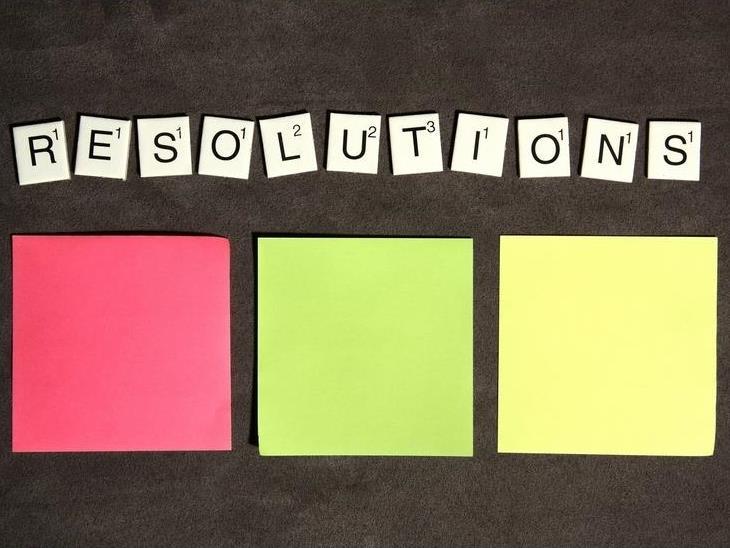Image: pexels.com
So many New Year’s resolutions are centred on self-improvement – eat less, exercise more, quit smoking – and often fertilised with shame, guilt and unrealistic expectations before eventually being extinguished by inevitable failure.
But what if instead of focusing solely on improving ourselves, we look at how we can make our working life and environment better? What if we replaced the notion of self-improvement with self-care and committed to looking after each other and ourselves in 2016.
Further reading: Making creative resolutions that stick
With both the organisation and the individual arts worker or artist in mind, we’ve come up with a collection of resolutions to better your working life in 2016.
Resolutions for an arts organisation
1. Begin meetings on a positive note
With pressing deadlines and packed agendas, it can be all too easy to get stuck in the nitty-gritty, but taking a moment to have everyone share a highlight from their weekend, or celebrate an individual success however big or small can boost connection between colleagues.
2. Start a staff club or salon
Passion is often what draws us to working in the arts, but exhaustive work demands often make it difficult to experience and discuss art with colleagues. At ArtsHub, this year we have started a monthly ArtsClub where we visit an exhibition, see a performance or attend a talk as a team. But you don’t need to go outside the office – Regional Arts Victoria hosts a fortnightly ‘Art Salon’ where a team member leads a discussion on a new topic.
3.Have a regular staff luncheon
Finding the time to eat lunch away from the computer is a difficult feet, let alone eating all together as a team. But see if your organisation can pick a designated day to have a group lunch either in or outside the office to get that staff banter buzzing!
4. Implement quiet Fridays
Flexibility in the workplace can boost morale as well as productivity, as Regional Arts Victoria found it introduced ‘Quiet Fridays’. As many arts workers balance work with their own artistic project, this initiative gives staff the option to work longer hours Monday to Thursday and take Fridays off, giving them structured time to work on their own creative practice.
5. Adopt the Email Charter
Dealing with emails is one of the biggest time-sucks for arts workers and opening your inbox can resemble being stuck on an endless treadmill. To address the maddening spiral, adopt the Email Charter and add a link to the ’10 Rules to Reverse the Email Spiral’ to your email signature to educate others.
6. Keep meetings minimal
We’ve all been in those “meetings about meetings” and bureaucratic merry-go-rounds. Limit meetings and when you must hold them only invite those people who need to be involve. Set a time limit and an agenda to ensure the meeting is short and consider a timer to ensure ramblers are forced to be succinct. It can help to schedule meetings first thing in the morning to minimise interruptions during the day. Another tip to help keep meetings to the point is to do them standing up, literally keeping people on their toes!
7. Arrange standing desks or ergonomic checks for workers
The adverse effects of sitting for a long period of time have made headlines, with popular advice being to alternative sitting and standing. If providing everyone with an adjustable desk is out of the question, encourage staff to form habits such as getting up and walking if on the phone, or remove rubbish bins from under the desk to encourage people to get up. A workplace health assessment will ensure chairs, lighting and computers are properly positioned and limit fatigue and absenteeism at the physio.
8. Make self-care and mental health part of OH&S
As well as prioritising OH&S in our workplaces, we should equally prioritise mental health and self-care by developing policies and procedures, making Mental Health First Aid Training being as commonplace as First Aid. Country Arts SA has developed a thorough checklist for arts and mental health projects which could be adopted to help organisations prioritise self-care.
9. Create a culturally diverse workplace
A more diverse workplace has a wider range of skills and approaches and a better integration with a wider client base. Consciously attract, recruit and promote diverse employees, leaders, performers and audiences. This year make the resolution to do more with cultural engagement within your workplace and programming, with some pointers found in parts of the literary sector and performing arts.
10. Walking meetings
Moving your body moves your mind. Step outside, get some vitamin D and get the heart pumping with a walking meeting.
11. Revamp your marketing
We can fall into the tramp of sticking to what we know, but tried and tested marketing methods becomes tired very quickly. This year try marketing with the heart with these ten tips.
12. Collaborate outside your industry
Arts sectors can often resemble silos, but a push towards cross-disciplinary projects as seen by Creative Victoria is seeingcollaboration as a key driver in the creative economy. Push boundaries and drive creativity by getting outside your silo in 2016.
13. Upskill your staff
Job satisfaction is increased when employees feel their skills are not only valuable to the organisation, but expanding and developing. Offer opportunities for your staff to upskill and learn new things via courses or conferences. It doesn’t have to be costly – arrange skill swaps between staff whereby the marketing manager exchanges social media tips with the accounts manager who runs through Excel pointers.
14. Stop over-programming and over-committing
While it can be tempting to squeeze as much into a program as possible, or pile on the commitments, the truth is doing more with less can contribute to burn out. As Esther Anatolitis, Executive Director, Regional Arts Victoria told ArtsHub, ‘Sometimes we can help artists better when we help fewer artists with more.’
Resolutions for the individual
15. Take lunch breaks and get outside
Break the habit of eating at your desk or scoffing down a muesli bar between meetings and take a proper lunch break. Make a pact with a colleague for a lunch time walk, find a nearby park or trade brown-bagging for buying lunch so you are forced to leave the office.
16. Avoid taking work home
Just because you can get your email 24/7 and login from anywhere doesn’t mean you should. If it can wait until tomorrow, it should. If you must take work home, set a time to switch off. Recognise when you are overloaded because you are trying to people-please and stick to your limits.
17. Set specific times to check email
According to a University of California-Irvine study, it can take us upward of 20 minutes to regain our attention after a seemingly minor distraction such as checking an email. Fight the urge to divert your attention as soon as you spot a notification by setting specific times for checking email.
18. Find a mentor, or be a mentor
Learning by observation and asking questions can help advance our careers, and finding a mentor in the field you wish to pursue can help the path seem a little clearer – even better is having a range of people you can turn to for advice in different areas of your career. But mentees need their mentors. Would you have got where you are today if it weren’t for the leg up or sound advice from a mentor? Pay it forward by offering to be mentor someone this year.
19. Master the art of public speaking
It’s often said that people fear public speaking more than death. Gain the gift of the gab with these essential public speaking skills from arts professionals.
20. Get better at networking
Networking can be frightening for some, a bore for others, or what seems to be an effortless joy for a select few. Make a vow to improve your skills this year by saying yes to events you’d usually decline; set a challenge to meet three new people before leaving an event; learn to get better at remembering names; and be bolder by introducing yourself to a group of people. A good icebreaker is simple and honest – ‘excuse me, but I don’t know anywhere here, do you mind if I join the conversation?’ Someone is bound to take you under their wing, and if not, you can always revert to hiding in the toilet!
21. Start a side project
Passion projects are a great way to improve your portfolio, kickstart your career, or help you prioritise doing what you enjoy. Find tips on how to start a side project here.
22. Begin that novel you’ve always wanted to write
Writing a book can be a great side project, and no better time to begin your first chapter than the beginning of a new year. You can gain helpful advice and get the push in the right direction with various courses at writers centres such as Writers Victoria.
23. Learn to appreciate your day job
It can be all too easy to resent your day job when you’d much rather be doing your own thing. But spending a fair chunk of your week in a state of resentment isn’t helping anyone. Switching your perspective about your work can make it more enjoyable. Many great artists and writers throughout history have supplemented their work with a day job, and they can have their benefits – freedom, security, and can often provide inspiration.
24. Be kinder to your colleagues
We can rush about our days and forget to take the time to be kind and generous with the very people we spend a large majority of our week with. Making an effort to be kinder to colleagues, ask questions and be understanding can make not only their day better, but our work environment more positive overall.
25. Conquer imposter syndrome
It’s a fluke that you go to where you are. You don’t deserve the promotion or award or new job or pat on the back. You really have no talent and soon they will find out. We get it, you’re an imposter. Only that you’re not – it’s just a syndrome affecting the talented and you can conquer it.
26. Get better at time management
Lack of time and money are key reasons that working in the arts comes with stress and potential burnout. But there are many ways to manage our most important resources – time and attention. Get better at time management in the arts with these tips.
27. Teach to supplement your income
Need an extra revenue stream to support your art practice? Workshops are big business and we’ve put together a guide to help you master teaching your craft.
28. Don’t compare yourself to other people
Resolutions typically stem from convincing ourselves we “should” change, we “should” do something, and we “should” be like everybody else. But you work in the arts, you aren’t like everybody else. You’re creative, passionate, hardworking, individual, caring, skilled, and great just as you are. Stop comparing yourself to other people and make 2016 a year that works for you – resolutions or no resolutions.





